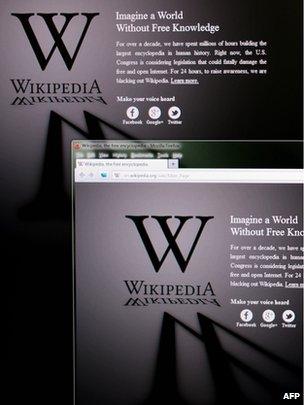Wikipedia - what can it tell us about Sopa?
- Published
- comments

The only pages still live on Wikipedia are on Sopa and Pipa - linked from its homepage
Students finishing essays, sports fans looking to settle an argument - or perhaps journalists wanting to check a fact - are going to be in trouble today. Wikipedia has gone black, much the most significant web presence to shut down for 24 hours in protest against the anti-piracy legislation now being considered in the United States.
The legislation in question, Sopa (Stop Online Piracy Act) and Pipa (Protect Intellectual Property Act) is still a long way from making it into law, particularly since the White House expressed some serious reservations.
But the lobbying battle from supporters and opponents is getting ever more heated, with Rupert Murdoch accusing President Obama of siding with his Silicon Valley paymasters - and the web community convinced that Hollywood and music industry money is the only reason that Sopa and Pipa ever got out of the starting blocks.
Understanding what it is all about is a challenge. Handily, Wikipedia has left its Sopa page, external live. (If you still need to find out about other topics, try the mobile site - strangely, still working. Or use one of Wikipedia's language sites, external and have Google Translate render it into English.)
Here's what Wikipedia's Sopa says about the penalties the courts might impose against sites which infringe copyright:
"The court order could include barring online advertising networks and payment facilitators from doing business with the allegedly infringing website, barring search engines from linking to such sites, and requiring Internet service providers to block access to such sites. The bill would make unauthorized streaming of copyrighted content a crime, with a maximum penalty of five years in prison for ten such infringements within six months. The bill also gives immunity to Internet services that voluntarily take action against websites dedicated to infringement, while making liable for damages any copyright holder who knowingly misrepresents that a website is dedicated to infringement."
Reasonably clear - extensive powers to cut off the revenues to sites deemed to be involved in piracy, and to force others - such as Google and ISPs - to block access.
But to understand how extensive these powers are and what impact they will have on the open internet, most of us who don't speak legalese will be dependent on analysts from either lobby for clarity.
Rory Cellan-Jones explains the background to Wikipedia's blackout
If you want to find out why Sopa will not be anything like as draconian as critics say then read this article quoting analyst from an intellectual property lawyer, external.
But if you want to find that argument taken apart, and learn about the mortal threat to a free internet, try this article from the Electronic Frontier Foundation, external.
Around the world, with Britain's Digital Economy Act, France's Loi Hadopi, and now America's Sopa, the story has repeated itself. The media industries claim the new laws will provide them with vital protection against the scourge of online piracy, the web community maintains that innocent victims will be harmed by blunderbuss legislation that will usher in a new era of censorship.
What we are lacking, of course is data on their impact on illegal file-sharing or on the open internet. There is none from the UK - nearly two years after the Digital Economy Act was rushed into law, it still has not been implemented, held up by legal challenges.
So, we have to look to France, where the Loi Hadopi was introduced in 2009 to regulate internet use and control copyright abuse.
Critics warned it would have a chilling effect on freedom - "like a Trojan Horse employed in an effort to control the internet," according to a group of French science fiction writers at the time. While groups of musicians, actors and entertainers signed letters of support for a law they believed would protect them.
We have had a good period to judge the impact. So has illegal filesharing been obliterated? Has the internet in France been crippled?
Back to Wikipedia - this time in French - to find out. Its entry on the Loi Hadopi, external has lots of material on the case for and against the law, though you will find more detail from opponents than supporters. But as far as I can make out there is only one short paragraph at the bottom of the entry on the law which relates to its impact.
It explains that the first warning letters to alleged lawbreakers were sent out in October 2010 - and that an opinion poll conducted in November found that 53% of French internet users who indulged in illegal downloading had either ceased or diminished this practice. (I've seen reports elsewhere suggesting that the initial deterrent effect of the law soon faded, and that France is not doing any better than its neighbours in the battle against online piracy.) Nothing, though, on the impact on the free internet.
Amidst all the noise of battle raging around this subject, and with the various lobbies spending huge sums to promote their version of the truth, the fair-minded outsider is in sore need of an objective source of information.
Sounds like a job for Wikipedia to me. Over the years, despite the occasional mistakes and mischief introduced by its amateur editors, the online encyclopaedia has gradually built an enviable reputation for accuracy and impartiality.
Its account of the detail of America's anti-piracy laws, the arguments surrounding them, and their impact if they are ever pushed through Congress, could be invaluable. But, having taken such a public stance on this issue, can Wikipedians ever be seen as objective about it in future?